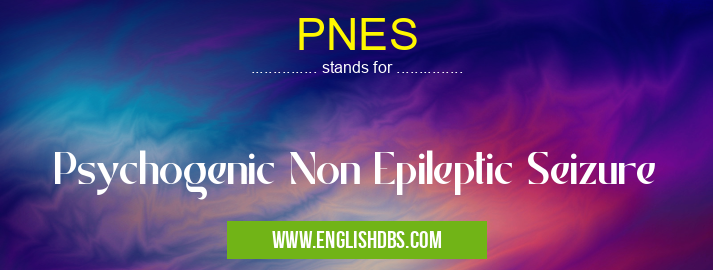What does PNES mean in UNCLASSIFIED
PNES (Psychogenic Non-Epileptic Seizures) are episodes that resemble epileptic seizures but are not caused by abnormal electrical activity in the brain. Instead, they are thought to be a result of psychological factors.

PNES meaning in Unclassified in Miscellaneous
PNES mostly used in an acronym Unclassified in Category Miscellaneous that means Psychogenic Non Epileptic Seizure
Shorthand: PNES,
Full Form: Psychogenic Non Epileptic Seizure
For more information of "Psychogenic Non Epileptic Seizure", see the section below.
Symptoms
PNES can manifest in a variety of ways, including:
- Motor symptoms: Shaking, jerking, swaying, or falling
- Sensory symptoms: Tingling, numbness, or hallucinations
- Cognitive symptoms: Confusion, memory loss, or staring spells
- Emotional symptoms: Anxiety, fear, or crying
Causes
The exact cause of PNES is unknown, but it is believed to be related to:
- Trauma: Psychological trauma, such as abuse, neglect, or witnessing violence
- Stress: Major life stressors, such as the loss of a loved one or financial difficulties
- Mental health conditions: Anxiety disorders, depression, or personality disorders
Diagnosis
Diagnosing PNES can be challenging, as the symptoms often overlap with those of epileptic seizures. To distinguish between the two, doctors may use:
- Electroencephalography (EEG): An EEG measures brain activity and can rule out epileptic seizures
- Video-EEG monitoring: Records both brain activity and behavior during an episode
- Psychological evaluation: Assesses for any underlying mental health conditions
Treatment
Treatment for PNES focuses on addressing the underlying psychological factors:
- Cognitive behavioral therapy (CBT): Helps patients identify and change negative thought patterns and behaviors
- Psychodynamic therapy: Explores unconscious conflicts and their impact on behavior
- Medication: Antidepressants or anti-anxiety medications may be prescribed to manage symptoms
Essential Questions and Answers on Psychogenic Non Epileptic Seizure in "MISCELLANEOUS»UNFILED"
What is a Psychogenic Non-Epileptic Seizure (PNES)?
A Psychogenic Non-Epileptic Seizure (PNES) is a seizure-like episode that resembles an epileptic seizure but has a psychological, rather than neurological, cause. It is a type of dissociative disorder, in which an individual loses touch with their surroundings and experiences a temporary alteration in their consciousness.
What are the symptoms of a PNES?
Symptoms of a PNES can vary widely and may mimic those of an epileptic seizure. Common symptoms include:
- Loss of consciousness
- Jerking or shaking movements
- Confusion or disorientation
- Speech difficulties
- Sensory changes, such as tingling or numbness
- Emotional outbursts
- Trance-like states
How is a PNES diagnosed?
Diagnosis of a PNES involves a thorough medical evaluation to rule out underlying neurological conditions, such as epilepsy. This typically includes:
- Physical examination
- Neurological examination
- Electroencephalogram (EEG) to record brain activity
- Psychiatric evaluation
What causes PNES?
The exact cause of PNES is unknown, but they are believed to be triggered by psychological factors. Possible contributing factors include:
- Past trauma or abuse
- Severe stress or emotional distress
- Anxiety or depression
- Dissociation
How is a PNES treated?
Treatment for PNES typically involves a combination of therapies, including:
- Psychotherapy, such as cognitive-behavioral therapy, to address underlying psychological issues
- Medication to manage anxiety or depression
- Self-help strategies, such as stress management techniques and coping mechanisms
Can PNES be cured?
While there is no cure for PNES, it can be effectively managed with treatment. With proper care, individuals with PNES can learn to identify and manage their triggers, reduce the frequency and severity of episodes, and improve their overall quality of life.
Final Words: PNES are a complex condition that can significantly impact an individual's life. By understanding the causes, symptoms, and treatment options, patients can work with their healthcare providers to manage their condition and improve their overall well-being.
